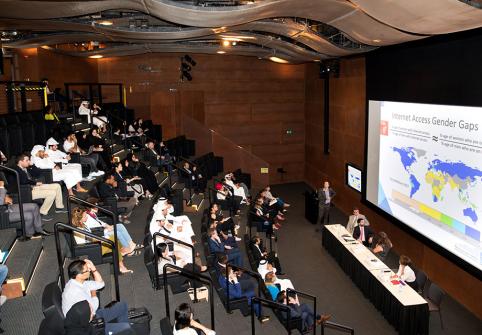News
HBKU Co-organizes Colloquium on Social Media and the Law
19 Oct 2017
In collaboration with Northwestern University in Qatar, Hamad Bin Khalifa University’s (HBKU) College of Law and Public Policy (CLPP) successfully co-organized a colloquium this Wednesday, October 18, on the relationship and impact of social media on the legal system. The discussion, led by a panel of experts in the field, was crucial to ensuring the promotion of positive thought leadership among relevant communities in Qatar. In doing so, HBKU continues to deliver on its commitment to enrich the quality of discourse and meaningful dialogue as a leading global university.
Important questions were raised during the colloquium on emergent social media tools, their uses, and consequent implications on the various legal systems, with a special focus on the GCC region. It introduced the attendees to the challenges faced by policymakers in dealing with the dramatic increase in social media engagement, driven by the rapid adoption of new technologies and devices.
 Professor Clinton Francis, founding dean of CLPP, said: “The legal profession is constantly evolving at a rapid pace in response to the dynamic changes taking place in society. At the College of Law and Public Policy, we pursue a holistic approach towards understanding and accounting for the various factors that influence the establishment of legal policy and practices. The social media colloquium exemplified this with a panel of experts who shared their perspectives on what is a contentious social and legal topic.”
Professor Clinton Francis, founding dean of CLPP, said: “The legal profession is constantly evolving at a rapid pace in response to the dynamic changes taking place in society. At the College of Law and Public Policy, we pursue a holistic approach towards understanding and accounting for the various factors that influence the establishment of legal policy and practices. The social media colloquium exemplified this with a panel of experts who shared their perspectives on what is a contentious social and legal topic.”
Associate Professors from Northwestern University in Qatar, Amy Kristin Sanders and Banu Akdenizil; Director of Policy at the QFC Regulatory Authority, Shaun Swan; and Associate at Dentons - Doha, Peter Motti, formed a panel of experts who presented their professional opinions and views on the subject.
The panel tackled the concepts of self-regulation and government control of social media, while highlighting the importance of considering issues ranging from privacy to data and consumer protection. A special emphasis was also placed on addressing the challenges presented by “big data” when formulating relevant laws and statutes.
